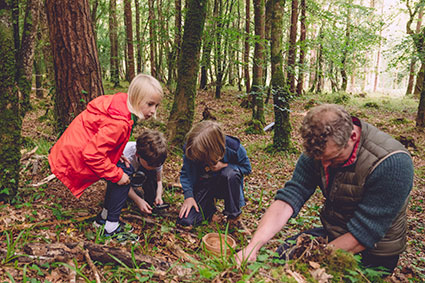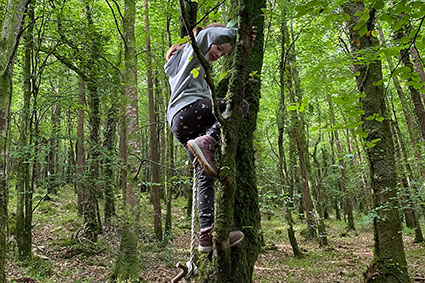
Forest School is a child-centred learning process, where children are offered the opportunity to spend time in natural settings that helps to support play, and supported risk taking. It develops confidence and self-esteem through learner inspired, hands-on experiences in a natural setting.
At the Nature Hub, we strive to create a safe and supportive space for children in the outdoors. A space where they have the opportunity to explore and play at their own pace, where they are offered the time and encouragement to learn with nature and where they can connect with their peers in a fun environment.
Forest School is an opportunity for the same group of learners and leaders to spend a sustained period outdoors, once a week, in a wooded environment, ideally year round. A regular routine is followed that is learner led and facilitated by trained leaders. Learning is holistic and closely related to developmental stage and regular curricular requirements. There must be a high ration of leaders to learners, everyone must be suitably dressed and a risk/benefit approach to health and safety is followed by all. (Irish Forest School Association, 2017)
Forest School Principles
Regular sessions
Forest school is a long term process of regular sessions, rather than a one-off or infrequent visits; the cycle of planning, observation, adaptation and review links each session.
Woodland setting
Forest school takes place in a woodland or natural environment to support the development of a relationship between the learner and the natural world.
Community
Forest school uses a range of learner-centred processes to create a community for being, development and learning.
Holistic development
Forest school aims to promote the holistic development of all those involved, fostering resilient, confident, independent and creative learners.
Opportunity to take risks
Forest school offers learners the opportunity to take supported risks appropriate to the environment and to themselves.
Qualified practitioners
Forest school is run by qualified Forest School practitioners who continuously maintain and develop their professional practice.
These principles are based on the UK model of Forest School learning that is promoted by the Forest School Association. www.forestschoolassociation.org
The Benefits of Forest School
- Co-operate as part of a team teaches child to be aware of others
- Problem solving
- Improves language and communication skills
- Enhances numeracy and literacy skills
- Hands-on learning
- Improves physical skills
- Connection with and understanding of nature
- Fosters confidence and independence
- Increased sense of place and belonging









